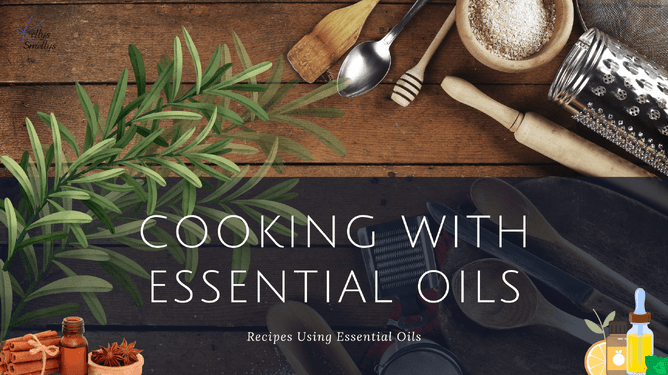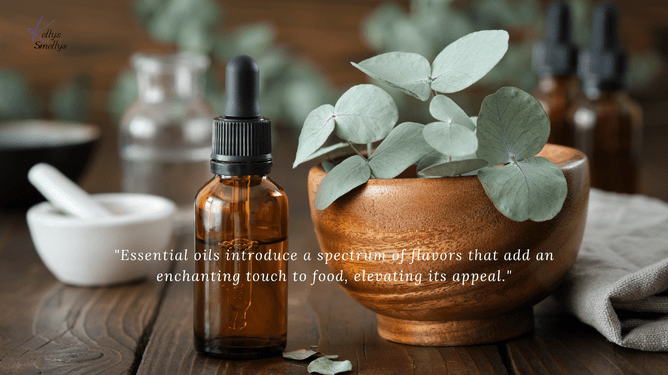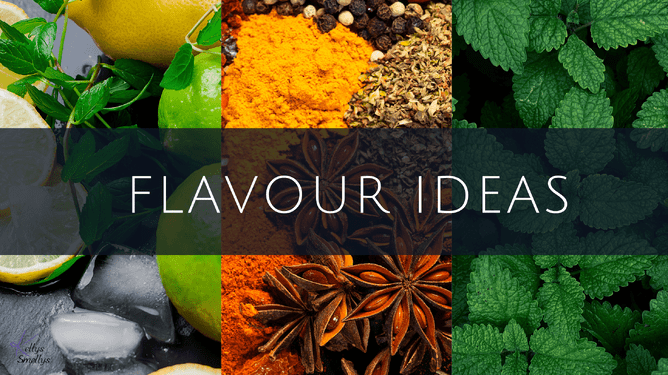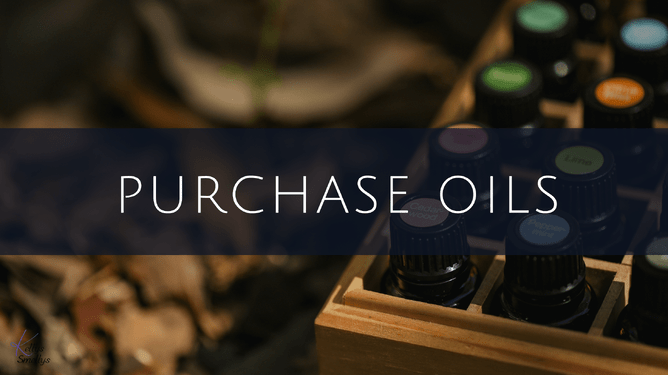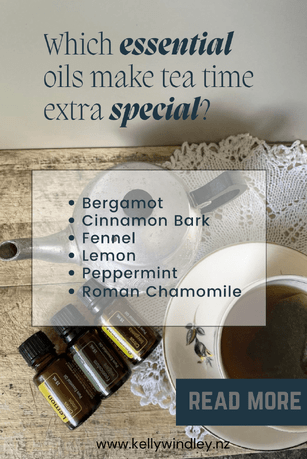Please read How to Use Your Essential Oils Safely before using essential oils in your Cooking Recipes.
Why Cook with Essential Oils?
Have you ever wished your everyday meals could pack more flavor or offer more health benefits? Cooking with essential oils might be the answer. Not only can essential oils elevate the taste of your dishes, but they also offer internal wellness benefits that can transform your cooking experience.
Not all essential oils are created equal! When using oils in cooking, it's vital to check that the oil is marked for internal use. Oils purchased from general stores, like lemon oil from Kmart, are often meant for fragrance only, and using them in your food can be unsafe. Stick to high-quality, certified pure grade oils, like doTerra's pure therapeutic-grade oils. Always check the label and instructions of each essential oil to ensure the essential oil is meant for internal use, while many oils can be used internally not all of them can be used for cooking or ingesting because of their chemical makeup.
I first tried essential oils in baking, one day when I was making Banana Bread and realised I had no Ginger then thought oh I could use my Ginger Essential Oil! I checked my bottle to make sure it was safe to use as a flavouring (internally - yes it was) and wow I now use my Ginger oil in everything that calls for Ginger as I find the Essential Oil seems to have more depth than the powdered Ginger in a box.
Essential Oils are actually plants so why would you not use them in cooking. Derived from the leaves, peels, roots, bark depending on each plant these oils can really transform ordinary dishes into the extraordinary.
To get started, try using lavender in lemon shortbread cookies for a delightful floral twist, or add a drop of peppermint oil to your next batch of brownies for a refreshing surprise. The possibilities are endless—experimenting with essential oils can turn any basic recipe into a gourmet dish.
How to Safely Use Essential Oils in Cooking
Before using essential oils in your cooking be sure to check the bottle of your essential oil to make sure it can be taken internally. A rule of thumb is to think - "would I use this plant in my cooking?" so herbs like Rosemary, Thyme, Oregano, Cloves, Citrus Fruits - but be aware that the Essential Oil form is highly concentrated, so in most cases you only need 1 drop. Either use a toothpick into the top of your Essential Oil bottle then swirl the toothpick into your dish or drop one drop of Essential Oil onto a spoon then add to your dish.
As I mentioned before you need to check the quality of your essential oils, are they pure? Can you find out where they come from? I only use doTerra oils internally as I know they are certified pure therapeutic grade oils, I can find out where they come from - from the number on the bottle and I can see an "I" on the bottle which means it is safe to take internally. Also if you buy a lemon oil from Kmart or Target etc you don't want to be putting it in your food, these type of oils are more for fragrance not their effects on your wellbeing.
Why should you consider cooking with essential oils? Beyond their ability to enhance flavor profiles, these oils offer internal health benefits that complement your culinary endeavors. Plus, they serve as a natural and convenient alternative when fresh ingredients are unavailable, like the Ginger for for my Banana Bread!
Many essential oils have therapeutic properties that go beyond flavor. For example, citrus oils can support detoxification, while fennel and ginger aid digestion. Adding these oils to your meals doesn’t just enhance the taste—it also supports your body in feeling its best. It's like a natural supplement in your cooking.
By adding an essential oil to your meals or drinks means you can enjoy the internal benefits as well as the powerful flavours of the essential oil.
Essential oils have a long shelf life, so instead of keeping a drawer full of herbs and spices, why not make use of your essential oils, or slowly replace all those spice boxes or jars with essential oils, they are actually more cost effective as you can use the oils for such a range of uses as well as in your cooking and they are always on hand so you don't have to rush to the shop if a recipe needs fresh basil or you've used your supply in the garden. AND you only need 1 drop in most recipes!!
Citrus Oils: A Burst of Brightness
Citrus Essential Oils: Bergamot, Grapefruit, Lemon, Lime, Tangerine, Wild Orange
Can be used in the following: Beverages, baked goods, yogurt, dip, salsa, zest
I love using Citrus oils in my water, it makes drinking water SO MUCH easier! You can also add citrus oils to tea, smoothies and baking recipes like cookies, scones or muffins. Add to recipes that call for the zest of a fruit - you will probably need to add a few drops of essential oils to equal the zest of say a lemon or an orange.
Citrus oils are extracted from the peels of fruit so they taste more like the peel, not the juice of the fruit.
Citrus oils can be added to yoghurts as well as dips, hummus and salsa recipes.
Also fabulous in sparkling water and your favourite alcoholic beverage on a hot day! But just one!
Spice Oils: Adding Heat and Depth
Spice Essential Oils: Black Pepper, Cassia, Cinnamon Bark, Coriander, Ginger, Fennel
Can be used in the following: Enhancing natural flavours, vegetables, meat marinade, sweet and savoury dishes
First off keep in mind that spicy oils are extremely potent, so use with care. Always use a toothpick with these oils and taste test your dishes as you go. More is always less when using essential oils in your cooking.
Use spicy oils to boost the flavour of your dishes. Use Black Pepper and Ginger to enhance natural flavours. Fennel and Coriander add extra flavour to both sweet and savoury dishes and Cassia and Cinnamon Bark are both strong and spicy which makes a great addition to sweet recipes, baking and for breakfast foods.
Herb Oils: Enhancing with Garden-Fresh Flavors
Herb Essential Oils: Basil, Cilantro, Marjoram, Oregano, Rosemary, Thyme
Can be used in the following: Use herb essential oils to subsitute for either dry or fresh herbs from your garden, Italian dishes, meat marinade, soup, bread, pasta, potatoes
Use these herb essential oils similar to as you use the fresh or dried kind, so you can use several different herb oils in a dish to create the flavour you want, just remember 1 drop at a time as essential oils are so potent.
Herbs have been used to flavour meals for absolutely ever, using essential oils are not only handy but also give a real kick of flavour.
Try a herb oil next time you make pasta, soup, meat marinades or fresh bread or a pizza base!
Floral Oils: A Touch of Elegance
Floral Essential Oils which can be used in cooking: Lavender, Geranium
Effective Mealtime Uses: Softening citrus flavors, adding a twist to plain recipes, desserts, tea
Floral oils are usually found in beauty products and perfumes, not so much in cooking, but a few of them can bring a fun, surprising flavor to light desserts like cookies, cakes, jellies, and teas. Their sweet, soft scent can also mellow out strong citrus flavors in recipes. Since floral oils are super potent, it's best to add just a tiny bit using the toothpick method when cooking.
Mint Oils: Refreshing and Cool
Mint Essential Oils which can be used in cooking or as flavouring: Peppermint, Spearmint
Effective Mealtime Uses: Beverages, desserts, salads, certain meats
Mint is a go-to flavor in cooking, and mint oils work great for desserts, candies, or whenever you want a cool, refreshing touch in a recipe. It's often paired with lamb or chicken to bring out the flavors of the meat or balance spicy or savory dishes. Mint also mixes well with other herbs because of its fresh, earthy taste. Since mint oils are super strong, just a tiny bit is needed—use the toothpick method for dishes. But for drinks like teas and smoothies, a full drop can do the trick.
If you're a tea lover, essential oils are a natural way to add flavor and make your teatime even more enjoyable. You only need a tiny bit to give your tea a strong flavor, so be careful not to overdo it—especially if you're using a small cup or stronger oils.
Next time you're in the kitchen, why not experiment with essential oils? Start small, get creative, and see how these powerful oils can transform your cooking experience. Have you already tried cooking with essential oils? I’d love to hear your thoughts—share your favorite recipes or experiences in the comments!
Disclaimer:
The information provided in this blog post is for educational purposes only and is not intended as a substitute for professional advice. Always consult a qualified healthcare professional before ingesting essential oils, especially if you are pregnant, nursing, have any medical conditions, or are taking medications. Not all essential oils are safe for internal use, so be sure to use high-quality, certified oils that are clearly labeled for consumption. The essential oils mentioned in this post refer specifically to those that are approved for internal use, such as doTerra oils. Always follow proper dosing recommendations and start with small amounts when cooking with essential oils. The author is not responsible for any adverse reactions or outcomes from the use or misuse of the information provided. Please read How to Use Your Essential Oils Safely before using them in your recipes.

